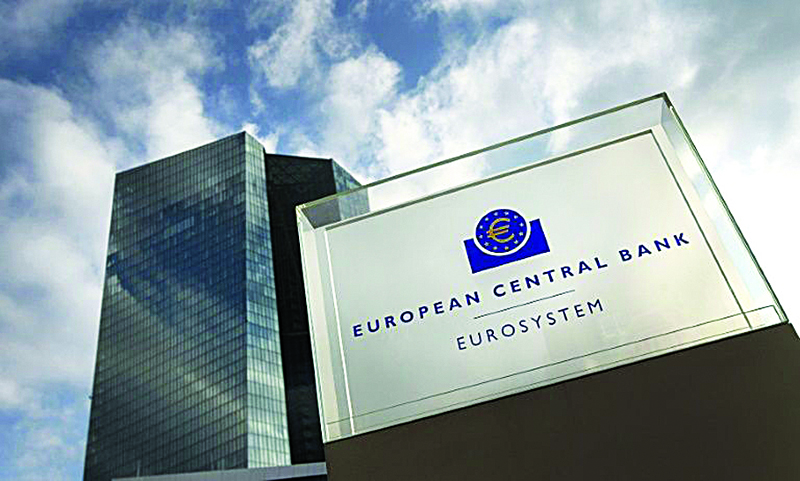
FRANKFURT: The European Central Bank is expected Thursday to prepare the ground for new stimulus measures, armed with a new set of economic forecasts and amid signs of a resurgence of the coronavirus pandemic. The ECB will publish its latest assessments on the eurozone's growth prospects through to 2022, which will be closely scrutinized for signs of whether the worst of the pandemic's devastating economic impact is over.
Inflation trends will also be key as fears of deflation are fuelled by sinking oil prices and consumers putting off purchases in the grim economic climate. The Frankfurt-based institution has unleashed unprecedented firepower to help the bloc fight its worst crisis.
It is in the process of pumping 1.35 trillion euros ($1.59 trillion) into the eurozone economy through its pandemic bond-buying program, known as PEPP. But with no clear prospect of an end to the health crisis in sight, investments are lackluster while households are also hesitant to make use of the huge credit lines. Across the Atlantic, a major policy shift by the US Federal Reserve has also thrown a spanner in the works.
In a stunning change, the Fed last week said it would now allow inflation to accelerate to let the economy generate more jobs. That means it will hold off from raising interest rates for now even if inflation moves about the central bank's target of 2.0 percent.
And that, in turn, has led to a significant weakening of the US dollar against the euro, something that could make eurozone exports less competitive. BNP Paribas economist William De Vijlder said the ECB was faced with "three headaches". "Inflation is too low and declining, the strong euro reinforces this development and there is concern that the change in the longer-term goal of the Fed… will complicate matters," he said.
Deflation threat
The euro recently touched $1.20 for the first time in two years, only paring some of the gains when the ECB's chief economist Philip Lane said the exchange rate "does matter" for monetary policy. With the economy still in dire straits as new infections surge again in major eurozone economies France and Spain, ECB chief Christine Lagarde's press conference will be scrutinized for hints on how the eurozone could hold down the euro.
Governors are expected to keep interest rates at historic lows, but hold off for now on expanding the PEPP envelope. But what will count most on Thursday "is the question of whether the stronger euro has already opened the door for more monetary stimulus in the coming months," said ING chief economist Carsten Brzeski. A new set of inflation forecasts could well strengthen the case for additional monetary easing.
The ECB defines price stability as inflation rates of "below, but close to" 2.0 percent. But alarm bells were sounded last week when data showed prices in August turned negative because of plummeting demand in face of the pandemic. Coming in at -0.2, it was the first time since 2016 that the inflation rate has been negative, well below analysts' expectations, and a steep slowdown from the positive rate of 0.4 percent in July.
While deflation, or falling prices, benefits consumers in the short run, if they begin delaying purchases in the hope of goods and services becoming even cheaper, it harms companies' revenues and profits and can lead them to cut employment, thus making consumers insecure about employment and likely to hold back spending further.
Capital Economics economist Andrew Kenningham said he expected the ECB to cut its inflation forecasts from the current prognosis of 1.3 percent by 2022. "The fall in inflation in August, as well as evidence that the recovery is slowing or has stalled, and the continued spread of the virus are sufficient justification for the ECB to stick to its dovish script." In central bank jargon, monetary doves are deemed more favorable to easing than the so-called hawks. Brzeski believed that "any downward revision will increase the likelihood of additional monetary stimulus." - AFP









